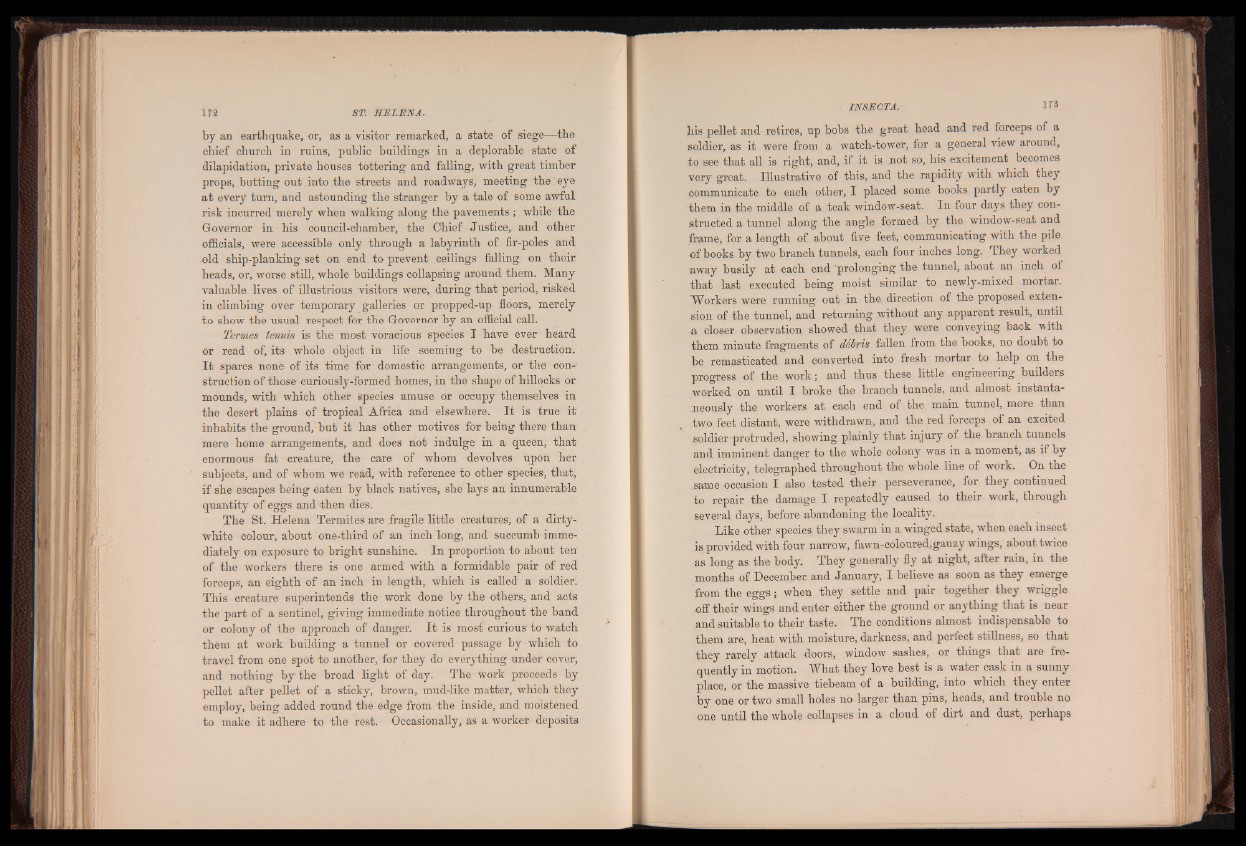
by an earthquake, or, as a visitor remarked, a state of siege—the
chief church in ruins, public buildings in a deplorable state of
dilapidation, private houses tottering and falling, with great timber
props, butting out into the streets and roadways, meeting the eye
a t every turn, and astounding the stranger by a tale of some awful,
risk incurred merely when walking along the pavements ; while the
Governor in his council-chamber, the Chief Justice, and other
officials, were accessible only through a labyrinth of fir-poles and
old ship-planking set on end to prevent ceilings falling on their
heads, or, worse still, whole buildings collapsing around them. Many
valuable lives of illustrious visitors were, during that period, risked
in climbing over temporary galleries or propped-up floors, merely
to show the usual respect for the Governor by an official call.
Termes tenuis is the most voracious species I have ever heard
or read of, its whole object in life seeming to be destruction.
I t spares none of its time for domestic arrangements, or the construction
of those curiously-formed homes, in the shape of hillocks or
mounds, with which other species amuse or occupy themselves in
the desert plains of tropical Africa and elsewhere. I t is true i t
inhabits the ground, but it has other motives for being there than-
mere home arrangements, and does not indulge in a queen, that
enormous fat creature, the care of whom devolves upon her
subjects, and of whom we read, with reference to other species, that,
if she escapes being eaten by black natives, she lays an innumerable
quantity of eggs and then dies.
The St. Helena Termites are fragile little creatures, of a dirty-
white colour, about one-third of an inch long, and succumb immediately
on exposure to bright sunshine. In proportion to about ten
of the workers there is one armed with a formidable pair of red
forceps, an eighth of an inch in length, which is called a soldier.
This creature superintends the work done by the others, and acts
the part of a sentinel, giving immediate notice throughout the band
or colony of the approach of danger. I t is most' curious to watch
them at work building a tunnel or covered passage by which to
travel from one spot to another, for they do everything under cover,
and nothing by the broad light of day. The work proceeds by
pellet after pellet of a sticky, brown, mud-like matter, which they
employ, being added round the edge from the inside, and moistened
to make it adhere to the rest. Occasionally, as a worker deposits
his pellet and retires, up bobs the great head and red forceps of a
soldier, as it were from a watch-tower, for a general view around,
to see that all is right, and, if it is not so, his excitement becomes
very great. Illustrative of this, and the rapidity with which they
communicate to each other, I placed some books partly eaten by
them in the middle of a teak window-seat. In four days they constructed
a tunnel along the angle formed by the window-seat and
frame, for a length of about five feet, communicating with the pile
of books by two branch tunnels, each four inches long. They worked
away busily at each end prolonging the tunnel, about an inch of
that last executed being moist similar to newly-mixed mortar.
Workers were running out in the. direction of the proposed extension
of the tunnel, and returning without any apparent result, until
a closer observation showed .that they were conveying back with
them minute fragments of débris fallen from the books, no doubt to
be remasticated and converted into fresh mortar to help on the
progress of the work; and thus these little engineering builders
worked on until I broke the branch tunnels, and almost instantaneously
the workers at each end of the main tunnel, more than
two feet distant, were withdrawn, and the red forceps of an excited
soldier-protruded, showing plainly that injury of the branch tunnels
and imminent danger to the whole colony was in a moment, as if by
electricity, telegraphed throughout the whole line of work. On the
same occasion I also tested their perseverance, for they continued
to repair the damage I repeatedly caused to their work, through
several days, before abandoning the locality.
Like other species they swarm in a winged state, when each insect
is provided with four narrow, fawn-coloured, gauzy wings, about twice
as long as the body. They generally fly at night, after rain, in the
months of December and January, I believe as soon as they emerge
from the eggs ; when they settle and pair together they wriggle
off their wings and enter either the ground or anything that is near
and suitable to their taste. The conditions almost indispensable to
them are, heat with moisture, darkness, and perfect stillness, so that
they rarely attack doors, window sashes, or things that are frequently
in motion. What they love best is a water cask in a sunny
place, or the massive tiebeam of a building, into which they enter
by one or two small holes no larger than pins, heads, and trouble no
one until the whole collapses in a cloud of dirt and dust, perhaps